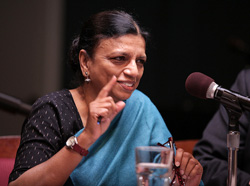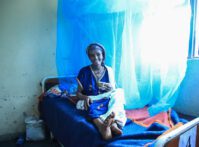-
How Effective Are International Efforts to Empower Women? Alaka Basu on Challenging the Patriarchy
November 1, 2013 By Donald Borenstein
“Everyone uses the word ‘empowerment.’ It’s now such an overused word,” says UN Foundation Senior Fellow Alaka Basu in this week’s podcast. “You are empowered if you have a choice of 10 different shampoos in the grocery store; you are empowered if you have 100 kinds of cereals to buy; you are empowered by virtually anyone wanting to sell you something.”
“Everyone uses the word ‘empowerment.’ It’s now such an overused word,” says UN Foundation Senior Fellow Alaka Basu in this week’s podcast. “You are empowered if you have a choice of 10 different shampoos in the grocery store; you are empowered if you have 100 kinds of cereals to buy; you are empowered by virtually anyone wanting to sell you something.”
Rather than addressing societal structures and attitudes that entrench gender inequality, Basu, who is contributing to a new white paper from the UN Foundation on women’s economic empowerment and reproductive health, sees many efforts to empower the most marginalized women around the world as too focused on the idea of creating marketplace options. “I’m trying to think beyond that way of looking at empowerment and ask, ‘What is meaningful empowerment?’”
While NGOs and governments have begun to incorporate women’s empowerment in many development programs, including the post-Millennium Development Goals agenda, popular metrics have struggled to adequately convey whether or not progress is really being made.
“How does expansion of women’s choices lead to outcomes in other fields?” Sometimes the answer to that question is not what people think, Basu says. For example, gains in access to the labor force and reproductive health care don’t always lead to gains for women elsewhere in society:
Data shows that women who are working are very good at achieving many kinds of gross reproductive health outcomes, but when you look at their attitudes, attitudes towards domestic violence for example, the majority of them still think it’s justified for a man to beat his wife…if she doesn’t produce a hot meal, or if she refuses sex, or if she talks to strangers.
“Empowerment in the…sense of just expansion of choices can occur in many ways which do not touch the patriarchy, which do not touch women’s status,” she says, “and therefore to assume women are empowered…[and] ideologies have changed, doesn’t make sense.”
Basu urges policymakers to consider women’s empowerment initiatives from the perspective of changing the core attitudes that shape gender inequities. “We mean expansion of choice according to our rules,” she says. “Even bad behaviors can be an outcome of expanded choice.”
More women entering the labor force could prove problematic for the family lives and personal goals of some women, for example, but creating a culture where women know they can always seek a job or higher education, if they chose, is an attitude that can create long-term ideological change, she says. Basu also sees property ownership as a pivotal means of core empowerment, by giving women an autonomous position of decision-making authority.
“Women become empowered when they can choose from a larger set of options than before…empowerment is a verb, not a noun, so it’s a process, moving from a situation of little or no power…to a situation where you have agency, and have options to apply that agency too.”
The key, Basu says, is to try to see the sum of individual components in a greater overall effort: “Life is not a randomly controlled experiment – we need to have a story line that links all of these issues.”
Basu spoke at the Wilson Center on October 10.
Friday podcasts are also available for download on iTunes.
Topics: Asia, community-based, development, Dot-Mom, economics, education, family planning, Friday Podcasts, GBV, gender, global health, India, livelihoods, maternal health, podcast, poverty, UN
 A Publication of the Stimson Center.
A Publication of the Stimson Center.







